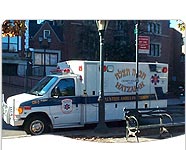 
Heart Association Urges Physicians To Get Cardiac Patients Into Rehab
(Reuters Health) The American Heart Association (AHA) recommends in a revised scientific statement
issued today that physicians strongly encourage patients to participate in cardiac rehabilitation and secondary
prevention programs to prevent recurrent cardiac events.
In 1994, the AHA declared that cardiac rehabilitation should include not just an exercise-training program
but also multifaceted programs aimed at reducing modifiable risk factors for coronary heart disease (CHD).
The revised statement reviews the recommended components for an effective cardiac rehabilitation/secondary
prevention program including the rationale for each component, with an emphasis on exercise training.
Studies have shown that exercise-based cardiac rehabilitation lowers cardiac mortality rates by 26% and total
mortality rates by 20% compared with usual medical care. Exercise-trained cardiac patients also have fewer nonfatal
MIs and require bypass surgery and angioplasty less often than patients who do not participate in exercise training.
Despite this, however, cardiac rehabilitation programs "remain underused in the United States, with an estimated
participation rate of only 10% to 20% of the greater than 2 million eligible patients per year who experience an acute MI
or undergo coronary revascularization," the writing group notes in the revised statement published in the January 25th
issue of Circulation: Journal of the American Heart Association.
Low rates of patient referrals, particularly among women, older individuals, and ethnic minorities, contribute to the
low participation rates, Dr. Arthur S. Leon from the University of Minnesota in Minneapolis and colleagues point out.
Inadequate third-party reimbursement for cardiac rehabilitation and limited accessibility to these programs in certain
areas of the country also play a role. There is also a lack of visibility and recognition by the public to the importance of
formal cardiac rehabilitation.
The statement also discusses alternative models to the traditional hospital- or community center-based settings for
cardiac rehabilitation, such as home and Internet-based approaches, and recommends areas for future research.
Circulation 2005;111.
The above message comes from "Reuters Health", who is solely responsible for its content.
The above is for general informational purposes only. Always consult your
physician regarding specific medical issues and call Hatzalah or your local
ambulance service in the event of an emergency.
Back to Digest Index
|









